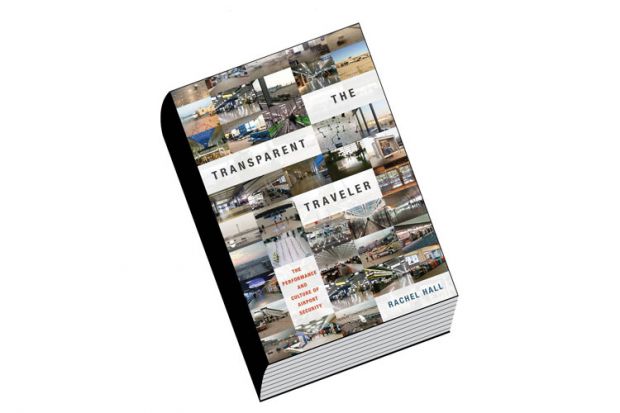As a child in the 1970s, when travelling, I was ordered by my parents to pack light. Travelling – even for relative nomads such as ourselves – was to be treated as a state of emergency in which bombs, terrorists and disasters in general were to be expected. We were to be prepared at a moment’s notice to run, carrying our belongings with us to safety. We looked with disdain at our fellow travellers, weighed down with the proverbial kitchen sink. What fools! We were, of course, mad, but our madness was quite common in Europe back then. It was one of the things that would most unnerve visiting Americans.
Americans are still new to all this, as The Transparent Traveler, a study of airport security by a Louisiana-based communications scholar, makes clear. Rachel Hall describes a state of emergency that has probably been normal in the rest of the world since the inception of mass air travel, and to non-Americans, it has a whiff of naivety.
Nevertheless, this is an excellent book. As Hall observes, the technological and cultural advances in the area of security have been so great and so rapid in recent years that they constitute a major part of our contemporary lives. Her argument centres on notions of transparency, from its aesthetics in a broadly architectural sense, to transparency in terms of biopolitics, to transparency as performance. She writes persuasively of security as theatre, or as she puts it pithily, “a cultural performance of risk”, demanded both by those in authority and their institutions, and their subjects. It couldn’t be any other way: without complicity on the part of the consumer, security simply couldn’t be enacted in the way that it is.
Hall’s framework draws on the usual cultural studies suspects, but she is a robust writer, unafraid to point out their shortcomings. So it was good to see Marc Augé’s glib concept of “non-place” get some stick: in the context of the contemporary airport, it no longer makes a lot of sense. There is, Hall points out, no longer any utopic release on clearing security, because security is, in effect, never cleared but an ongoing performance.
The most useful parts of the book for readers will, I suspect, be its rich visual analyses, which subject the landscape of security to the attention normally given to a Renaissance altarpiece. I particularly liked the discussion of the Blueprint People (her term) who populate a US State Department video on airport security. They constitute a new species of human, specially evolved for the purpose: “uniformly male, raceless, hairless, faceless, odorless [sic], silent, disconnected, evenly distributed in space, unperturbed, unflappable”.
I also enjoyed the way that Hall describes the collusion between the fashion and security industries, the former supplying now-familiar accessories to ease the latter’s business. And Hall’s account of the S&M character of the new security culture (in the section “Rape Jokes and the Threat of Bodily Penetration”) is both very funny and very disturbing. There are many other examples; suffice to say this is a book that is attentive to specifics, and the visual in particular.
There’s only one bum note: a conclusion that calls, weakly, for an “alternative politics of mobility”, a utopian space that welcomes all. It was hard to see what, precisely, this would mean in practice. The enlightened and liberal university campus is not, sadly, the same as John F. Kennedy International Airport with its countless millions of pissed-off travellers who simply need processing. But that’s a small point: The Transparent Traveler is a lucid take on a crucial question, and for the time being, I doubt there’s anything better on it.
Richard J. Williams is professor of contemporary visual cultures, University of Edinburgh. He is writing a history of the so-called creative city.
The Transparent Traveler: The Performance and Culture of Airport Security
By Rachel Hall
Duke University Press, 240pp, £59.00 and £16.99
ISBN 9780822359395 and 9609
Published 25 September 2015
Register to continue
Why register?
- Registration is free and only takes a moment
- Once registered, you can read 3 articles a month
- Sign up for our newsletter
Subscribe
Or subscribe for unlimited access to:
- Unlimited access to news, views, insights & reviews
- Digital editions
- Digital access to THE’s university and college rankings analysis
Already registered or a current subscriber?




